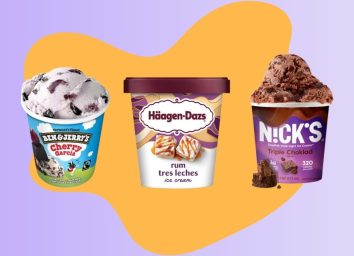12 Ice Cream Brands That Use the Lowest Quality Ingredients

Ice cream is not just a dessert; it’s a passport to instant joy and childhood nostalgia. With its creamy texture and a rainbow of flavors, it has the magical ability to turn a mundane day into a celebration. Whether it’s the classic vanilla bean or the rich and indulgent chocolate, there’s a scoop out there for everyone.
Unfortunately, some companies that claim to produce healthy foods or alternatives to traditional ice cream may not have your ultimate health in mind. Sure, they may produce “low fat” or “low calorie” items, but that doesn’t mean these options are made with the highest-quality ingredients. Some classic ice cream brands offer a satisfying flavor but may not be made with the best-for-you ingredients.
To help you shop for the best pints, we’ve flagged ingredients found in low-quality ice creams that may pose a health risk if eaten in excess. Before you fulfill that hankering for a scoop of mint chip, Rocky Road, or another ice cream option, check out our list of the top 12 ice cream brands with the lowest-quality ingredients. Read on, and for what to buy instead, check out the Ice Cream Brands That Use the Highest Quality Ingredients.
Blue Ribbon Classics
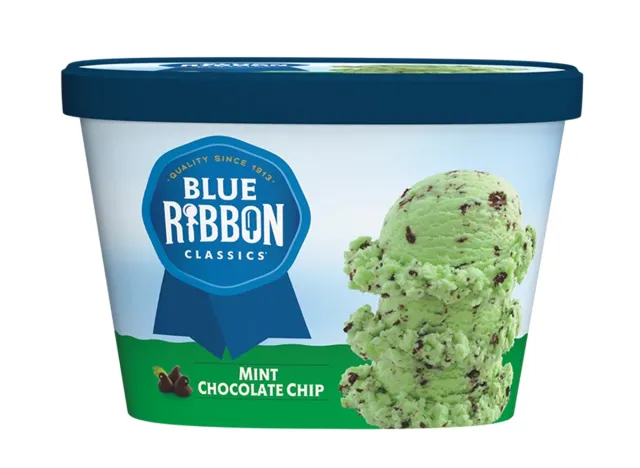
Calories: 150
Fat: 6 g (Saturated fat: 4.5 g)
Sodium: 55 mg
Carbs: 22 g (Fiber: 0 g, Sugar: 16 g)
Protein: 2 g
Blue Ribbon Classics uses so many low-quality ingredients that its products don’t even qualify as ice cream—they’re “frozen dairy desserts,” meaning that the products don’t meet the FDA’s minimum requirements for being ice cream. From containing dairy milk solids to palm kernel oil (a leading factor of deforestation) to artificial colors and flavors, this dessert doesn’t deserve a spot in your freezer.
For example, its Blue Ribbon Mint Chocolate Chip flavor cream contains two artificial colors, Yellow 5 and Blue 1—the former may be linked to hypersensitivity and may be carcinogenic, although more data is needed to confirm this. When it comes to sugar, not only are flavors like rocky road loaded with it—21 grams, to be exact, which is 42% of your daily recommended maximum—but that sweet taste comes from low-quality sources, including high fructose corn syrup and corn syrup.
Blue Bell Creameries
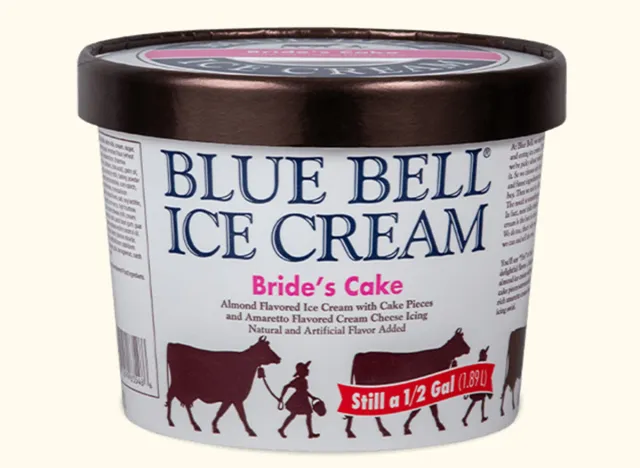
Calories: 240
Fat: 12 g (Saturated fat: 7 g)
Sodium: 90 mg
Carbs: 27 g (Fiber: 0 g, Sugar: 23 g)
Protein: 4 g
Blue Bell Creameries’ labels depict a young girl walking a cow on a lead, but don’t let this marketing mislead you into thinking you’re getting a high-quality dairy product. Many of Blue Bell’s ice creams contain a plethora of modified ingredients that may have unwanted side effects. Certain ingredients, such as xanthan gum, have been linked to an increased risk of type 2 diabetes, and the umbrella term “artificial flavors” is too ambiguous.
For example, Blue Bell Creameries Bride’s Cake has an endearing name and enticing almond and amoretto flavorings, but this ice cream may not be what you want to eat before your big day. With 240 calories per 2/3 cups and 23 grams of total sugar (17 of which are “added”), it contains these aforementioned low-quality ingredients along with high fructose corn syrup and stabilizers like cellulose gum, guar, carrageenan, and soybean oil.
Blue Bunny
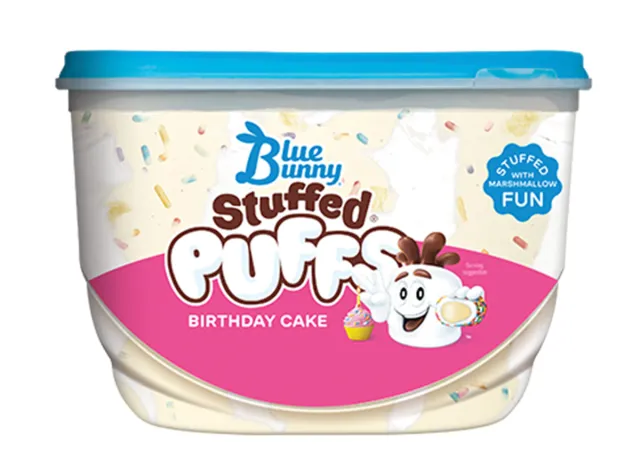
Calories: 200
Fat: 7 g (Saturated fat: 6 g)
Sodium: 60 mg
Carbs: 32 g (Fiber: 0 g, Sugar: 32 g)
Protein: 1 g
Featuring a playful logo with a smiling blue bunny, Blue Bunny ice cream may seem like a kid-friendly option. However, it’s important to consider the nutritional content. Many of Blue Bunny’s products are high in sugar and saturated fats, which, when consumed in excess, can contribute to health issues such as obesity, diabetes, and heart disease.
Blue Bunny’s Stuffed Puffs Birthday Cake, for example, includes a range of ingredients that have no business being in frozen dairy dessert. This marshmallow-infused ice cream contains artificial colors like Yellow 5 and Red 40, multiple stabilizing gums, modified food starch, and artificial flavors. While there’s no conclusive evidence that GMOs are harmful to human health, this product might not be suitable if you’re looking for an ice cream made with all-natural ingredients.
Turkey Hill Dairy
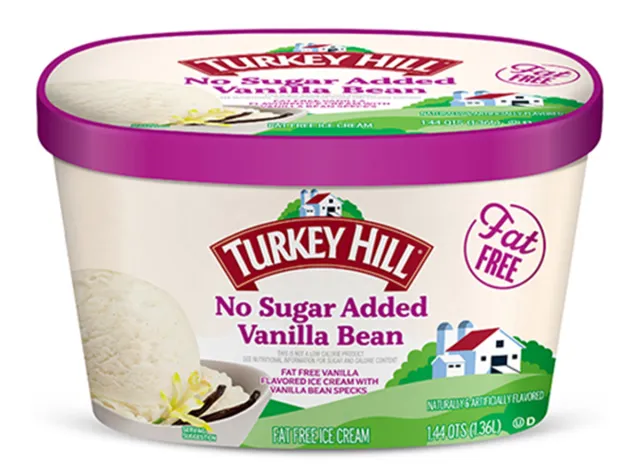
Calories: 100
Fat: 0 g (Saturated fat: 0 g)
Sodium: 95 mg
Carbs: 26 g (Fiber: 7 g, Sugar: 8 g)
Protein: 4 g
Turkey Hill Dairy offers a wide variety of ice cream options. Many of its classic options are made with the ingredients one would expect to find in an ice cream, like cream and sugar. But its products tend also to be made with ingredients such as carrageenan, locust bean gum, corn syrup, and other low-quality additives.
Turkey Hill’s no-sugar-added ice cream line includes products like the No-Sugar-Added Vanilla Bean ice cream, which contains sorbitol—a sugar alcohol commonly found in sugar-free gums that can cause gastrointestinal issues such as diarrhea and bloating when consumed in large quantities. This ice cream also uses artificial sweeteners like sucralose and acesulfame K. While these are FDA-approved and generally considered safe (GRAS), some studies suggest they might affect the gut microbiome and metabolism, which is the opposite of what many are trying to achieve when eating a “diet” ice cream.
Halo Top
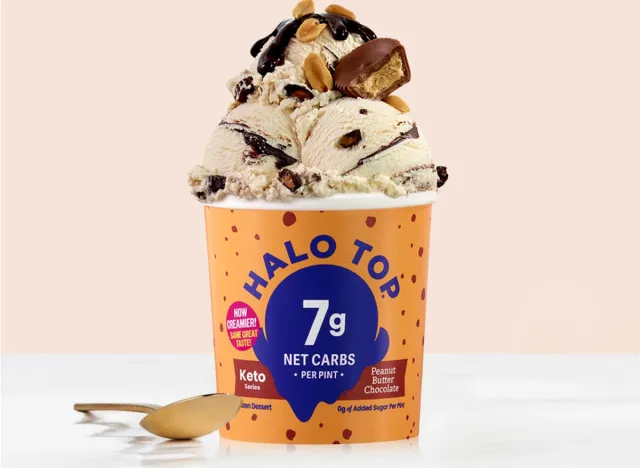
Calories: 210
Fat: 20 g (Saturated fat: 10 g)
Sodium: 160 mg
Carbs: 15 g (Fiber: 5 g, Sugar: 2 g)
Protein: 2 g
Halo Top is known for being a lower-calorie option that allows consumers to eat the entire pint. But when you look closer at the ingredient list and see things like erythritol, vegetable glycerin, and carnauba wax, you may realize you are better off eating the real deal.
“Keto” doesn’t necessarily mean “healthy.” Halo Top’s Keto Peanut Butter Chocolate ice cream is just as, if not more, unhealthy than other brands on this list. Two scoops of this ice cream contain 160 milligrams of sodium and 10 grams of saturated fat, which is higher than many regular brands. In terms of ingredients, it includes cottonseed oil, cellulose gel, and cellulose gum. While these ingredients are generally considered safe, they are often considered lower-quality than natural alternatives. If you’re looking for a truly healthy treat, it’s important to consider more than just the keto label.
Mayfield Dairy Farms
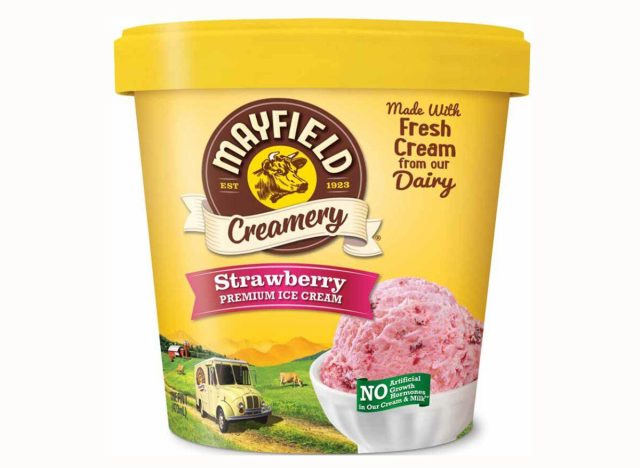
Calories: 170
Fat: 8 g (Saturated fat: 5 g)
Sodium: 50 mg
Carbs: 24 g (Fiber: 0 g, Sugar: 20 g)
Protein: 2 g
Unlike premium brands that prioritize high butterfat content and minimal air incorporation, Mayfield Dairy’s ice cream has taken a different direction, potentially compromising its texture and flavor depth. With ingredients like cheaper corn syrup instead of sugar, it isn’t one that many would consider high quality.
Mayfield Dairy Farms’ Strawberry Ice Cream doesn’t use strawberries’ natural red coloring to add a splash of pizazz to its ice cream.
Instead, it uses the artificial dye Red 40. While Red 40 is widely used and generally considered safe by regulatory authorities, some studies suggest it may induce hyperactivity in children and could potentially contribute to health issues such as inflammation, gut microbiome disruption, and cellular changes. However, more high-quality research is needed to fully understand these risks. If you prefer natural ingredients, you may want to choose a product that uses real strawberries for color.
Good Humor
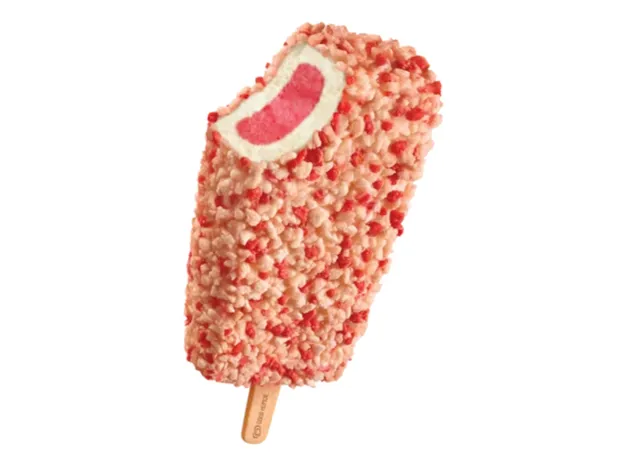
Calories: 160
Fat: 9 g (Saturated fat: 3.5 g)
Sodium: 60 mg
Carbs: 19 g (Fiber: 0 g, Sugar: 11 g)
Protein: 1 g
Some perceive Good Humor as a lower-quality brand within the ice cream market due to its use of artificial flavors and preservatives, which can affect the taste and texture compared to premium brands that use natural ingredients.
A staple in old-school elementary school cafeterias (did we just make you feel old?), Good Humor’s Strawberry Frozen Dessert Bar may not be made all “in good humor” (pardon the pun). This “dessert bar”—not even an ice cream bar—includes Red 40 as a prominent ingredient, while real pureed strawberries make up less than 2% of the bar. Additionally, it contains unspecified artificial flavors, raising concerns about ingredient transparency. While we’re not against artificial ingredients, as they are generally deemed safe, consumers who prioritize transparency and natural ingredients might want to give these bars a wide berth.
OREO Frozen Dairy Desserts
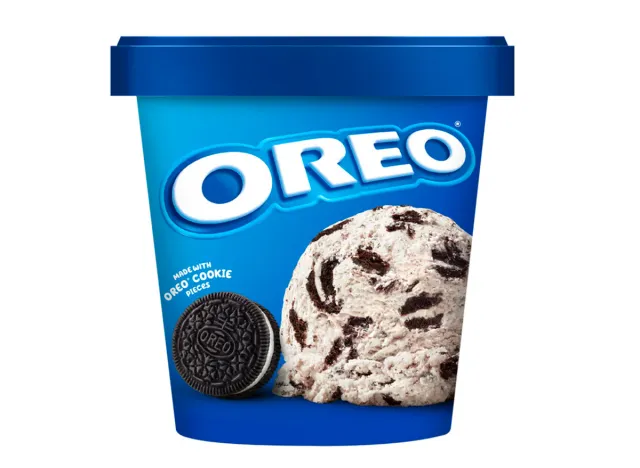
Calories: 180
Fat: 6 g (Saturated fat: 3.5 g)
Sodium: 95 mg
Carbs: 30 g (Fiber: 0 g, Sugar: 20 g)
Protein: 1 g
OREO Frozen Dairy Dessert packs all the deliciousness and empty calories of a classic OREO into a binge-able ice cream that contains palm oil and propylene glycol. The latter isn’t necessarily harmful in small doses but is more strictly regulated in Europe than in the United States, which may raise red flags for some. This dairy dessert doesn’t lean on classic ice cream ingredients like cream. Instead, “dairy product solids” are used.
Bryers CarbSmart
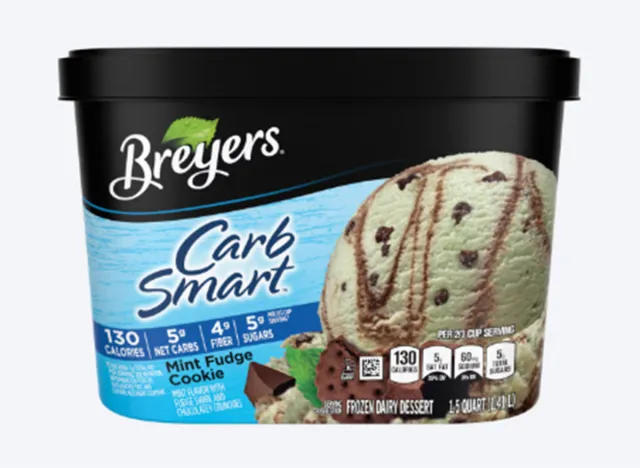
Calories: 130
Fat: 7 g (Saturated fat: 5g)
Sodium: 60 mg
Carbs: 20 g (Fiber: 4 g, Sugar: 5g)
Protein: 2 g
Sure, this frozen dairy dessert is lower in carbs, but that doesn’t mean Breyer’s CarbSmart options are made with quality ingredients. This brand uses ingredients that are rarely used in classic, high-quality ice cream, such as guar gum, soluble corn fiber, and maltitol syrup, hence why it’s called a “frozen dairy dessert” instead of ice cream.
Like many of the brand’s options, the mint fudge cookie variety leans on acesulfame potassium, also known as ace-K, instead of added sugar. This sweetener swap can help manage blood sugar levels but raises some concerns. While acesulfame potassium is approved by regulatory agencies such as the FDA and is generally considered safe, some studies have suggested a potential link to certain cancers in animals. However, conclusive evidence in humans is lacking. If you have concerns about artificial sweeteners, you might want to consider this when choosing your ice cream.
Nicks’s
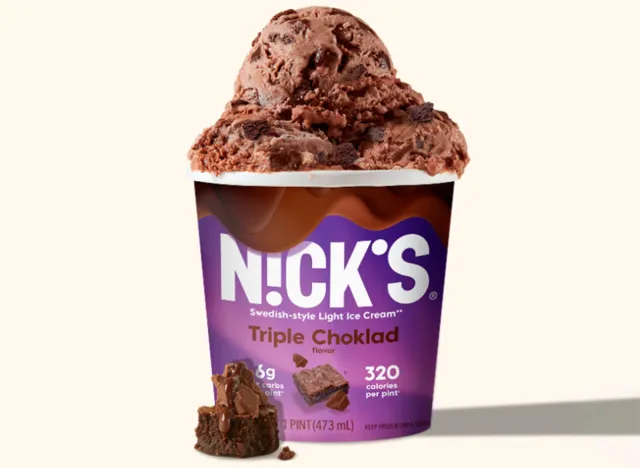
Calories: 110
Fat: 7 g (Saturated fat: 4.5g)
Sodium: 150 mg
Carbs:23 g (Fiber: 8 g, Sugar: 1g)
Protein: 4 g
Nick’s Ice Cream is perceived as low quality due to a combination of factors, such as the use of artificial flavors and preservatives, which can compromise the natural taste and texture of the ice cream. For example, the Triple Choklad flavor uses a variety of processed ingredients (such as soluble corn fiber and modified plant-based oil), sugar alcohols (including allulose, erythritol, and sorbitol), and chemical stabilizers/emulsifiers (like guar gum and cellulose gum). While these ingredients help reduce calories and manage sugar content, they can cause digestive issues and may be perceived as lower quality by consumers looking for more natural, less processed ice cream options.
Great Value
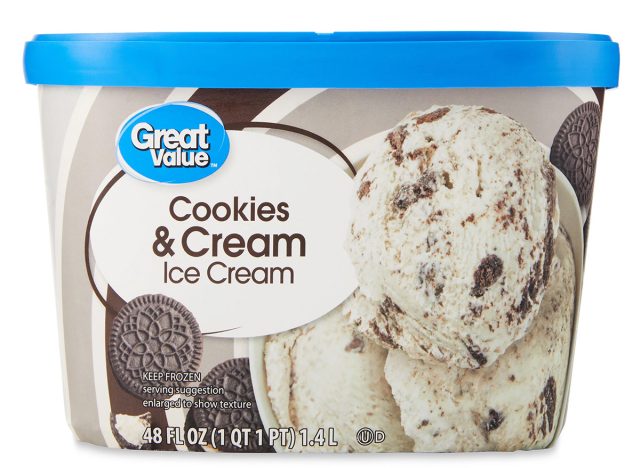
Calories: 210
Fat: 10 g (Saturated fat: 6 g)
Sodium: 110 mg
Carbs: 27 g (Fiber: 0 g, Sugar: 21 g)
Protein: 3 g
Great Value ice creams may be easy on the wallet, but they could be better when it comes to quality ingredients. Due to the added corn syrup and the many emulsifiers found in these ice creams (including carrageenan, an ingredient that has been associated with digestive issues and undergoes extensive processing), this brand is best reserved as a once-in-a-while treat rather than an everyday enjoyment.
Favorite Day
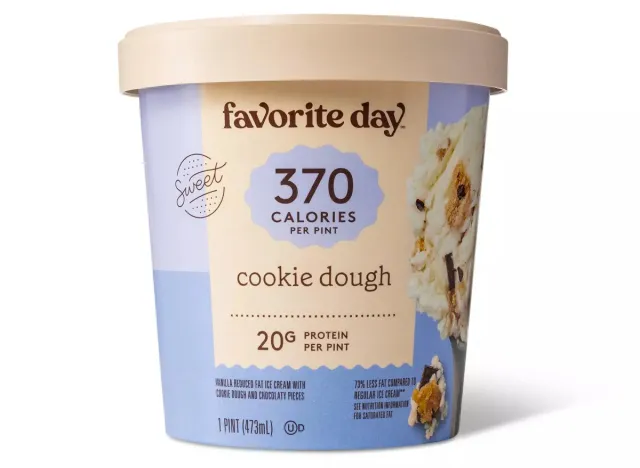
Calories: 120
Fat: 3.5 g (Saturated fat: 2 g)
Sodium: 70 mg
Carbs: 21 g (Fiber: 4 g, Sugar: 9 g)
Protein: 7 g
We get it. You run into Target for “just one thing,” and you somehow find yourself with a cart full of things you weren’t planning on purchasing. If you are focused on eating ice cream with the highest-quality ingredients, resist the urge to toss a Favorite Day-branded ice cream into your cart.
Yes, this ice cream is lower in calories than many others, providing an impressive amount of fiber and protein. But the ingredients used to make that happen may not be worth enjoying. The Cookie Dough variety leans on ingredients such as soybean oil, which doesn’t feel like it belongs in a frozen dessert. The use of erythritol as a sweetener may concern some, as this option has been linked to heart health concerns, but the FDA considers it to be safe and even notes that it’s “slightly lower in calories than sugar and do not promote tooth decay or cause a sudden increase in blood glucose.” It’s more a preference of whether you don’t like how sugar alcohols taste.
- Source: Meijaard, E., Brooks, T. M., Carlson, K. M., Slade, E. M., Garcia-Ulloa, J., Gaveau, D., Lee, J. S. H., Santika, T., Juffe‐Bignoli, D., Struebig, M. J., Wich, S. A., Ancrenaz, M., Koh, L. P., Zamira, N., Abrams, J. F., Prins, H. H. T., Sendashonga, C. N., Murdiyarso, D., Furumo, P. R., . . . Sheil, D. (2020). The environmental impacts of palm oil in context. Nature Plants, 6(12), 1418–1426. https://doi.org/10.1038/s41477-020-00813-w
- Source: Kobylewski, S., & Jacobson, M. F. (2012). Toxicology of food dyes. International journal of occupational and environmental health, 18(3), 220–246. https://doi.org/10.1179/1077352512Z.00000000034
- Source: Daly, J., Tomlin, J., & Read, N. W. (1993). The effect of feeding xanthan gum on colonic function in man: correlation with in vitro determinants of bacterial breakdown. The British journal of nutrition, 69(3), 897–902. https://doi.org/10.1079/bjn19930089
- Source: Liauw, S., & Saibil, F. (2019). Sorbitol: Often forgotten cause of osmotic diarrhea. Canadian family physician Medecin de famille canadien, 65(8), 557–558.
- Source: Bian, X., Chi, L., Gao, B., Tu, P., Ru, H., & Lu, K. (2017). The artificial sweetener acesulfame potassium affects the gut microbiome and body weight gain in CD-1 mice. PloS one, 12(6), e0178426. https://doi.org/10.1371/journal.pone.0178426
- Source: Miller, M. D., Steinmaus, C., Golub, M. S., Castorina, R., Thilakartne, R., Bradman, A., & Marty, M. A. (2022). Potential impacts of synthetic food dyes on activity and attention in children: a review of the human and animal evidence. Environmental health : a global access science source, 21(1), 45. https://doi.org/10.1186/s12940-022-00849-9
- Source: Zhang, Q., Chumanevich, A. A., Nguyen, I., Chumanevich, A. A., Sartawi, N., Hogan, J., Khazan, M., Harris, Q., Massey, B., Chatzistamou, I., Buckhaults, P. J., Banister, C. E., Wirth, M., Hebert, J. R., Murphy, E. A., & Hofseth, L. J. (2023). The synthetic food dye, Red 40, causes DNA damage, causes colonic inflammation, and impacts the microbiome in mice. Toxicology reports, 11, 221–232. https://doi.org/10.1016/j.toxrep.2023.08.006
- Source: Fowles, J. R., Banton, M. I., & Pottenger, L. H. (2013). A toxicological review of the propylene glycols. Critical reviews in toxicology, 43(4), 363–390. https://doi.org/10.3109/10408444.2013.792328
- Source: Debras, C., Chazelas, E., Srour, B., Druesne-Pecollo, N., Esseddik, Y., Szabo de Edelenyi, F., Agaësse, C., De Sa, A., Lutchia, R., Gigandet, S., Huybrechts, I., Julia, C., Kesse-Guyot, E., Allès, B., Andreeva, V. A., Galan, P., Hercberg, S., Deschasaux-Tanguy, M., & Touvier, M. (2022). Artificial sweeteners and cancer risk: Results from the NutriNet-Santé population-based cohort study. PLoS medicine, 19(3), e1003950. https://doi.org/10.1371/journal.pmed.1003950



